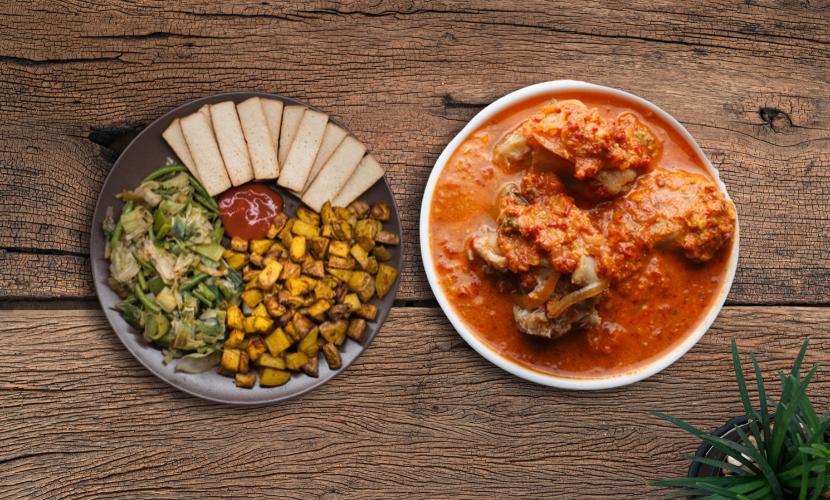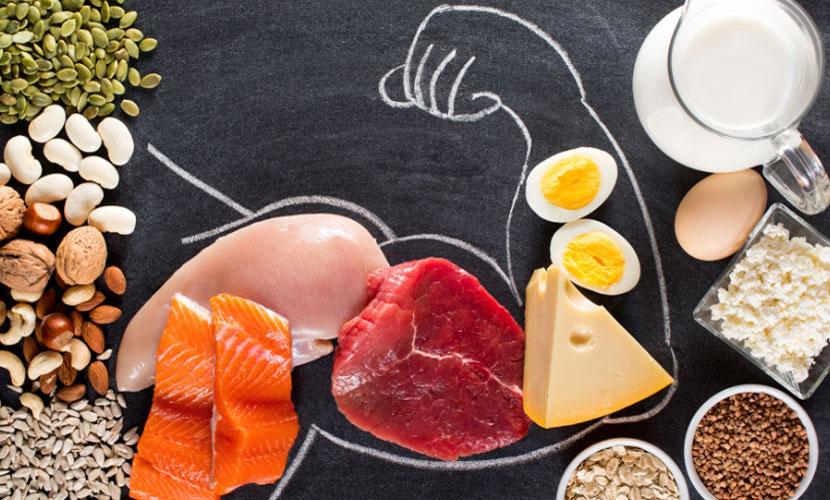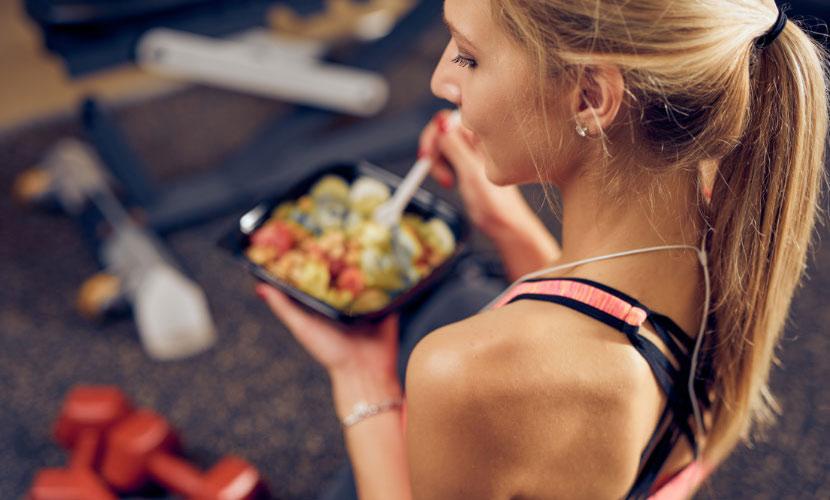🏆 As seen and loved on Shark Tank Dubai 🏆

Veg vs Meat Eating Athletes
Plant-Based Diet or Meat-Based Diet: Influence on Athletic Performance
Can athletes be vegetarians? Well, that is an important question. Turning into vegetarianism has become widely popular among fitness enthusiasts, nutritionists, and restaurateurs in the UAE. People in UAE accept that health is the primary driving factor for reducing meat consumption.
The worldwide plant-based meat market is $18.6 billion approx., with the Middle Eastern market representing $176.5 million. Its yearly development projects will be 4-5 percent in the next four years. With this, restaurants, cafes, and meal deliveries now include healthy vegetarian meal plans.
Regardless of whether you are simply evaluating a vegetarian diet plan or have been vegetarian for some time, we make fortifying, convenient vegetarian workout diet plans. We organize standard deliveries to clients all through Dubai. With that, we remove the problem of sticking to bland vegetarian recipes for life. We provide delectable and freshly made food to all our clients.
Famous veg and meat-eating athlete in the world
The universe of sports has seen a good result between a vegan diet or vegetarian meals and athletic performance. Furthermore, they have claimed that these diets have been beneficial for them. Some of the renowned names are:
Venus Williams has received the prestigious Wimbledon women's singles title more than four times. She was diagnosed with an autoimmune disease called Sjogren's syndrome in 2011, and after that, she switched to a vegan diet.
Tony Gonzalez is one of the most popular vegan football athletes in the NFL. When he realized that a vegetarian athlete's diet affects their performance, he left the meat and turned vegan.
Lewis Hamilton is the world's ten highest-paid athlete, as per Forbes. Lewis learned the benefits of a plant-based diet and athletic performance, and after that, he shifted to a vegetarian athlete meal plan.
Scott Jurek is a long-distance and ultramarathon runner. He holds a record of running 165.7 miles over 24 hours. To avoid the family's history of chronic disease, he opted for vegan food and chose a green diet.
David Haye is a prominent boxer. When he got a severe injury, he shifted his total dietary routine and opted for a plant-based diet plan.
Hannah Teter is an American snowboarder and a winner of three-time Olympic medals. Hannah adopted a vegetarian fitness meal plan after achieving a gold medal in 2010.
Mac Danzig is a black belt holder in Brazilian Jiu-jitsu and a vegan Mixed Martial Arts athlete. He revealed his vegetarian athlete diet affects his performance in many interviews.
Jermain Defoe has scored 150 goals in Premiere League history and is the seventh-best goal scorer. He revealed that he felt difficulty maintaining a vegetarian fitness meal plan initially but soon accepted it.
Tia Blanco chose the plant-based diet in 2013. She admits that she loves the way veganism feels physically and mentally.
Patrick Baboumian gave up meat and opted for veganism in the year 2011. He became a famous veganism influencer and suggested many ways to live a healthy vegan lifestyle.
Dietary needs of an athlete

There is a lot of influence of a vegetarian diet on the physical performance of athletes. They require many macronutrients like carbohydrates, fat, and protein in larger quantities in their everyday food selection. Contestants routinely engaging in arduous exercises need to know about the following daily dietary requirements:
Energy: To meet their energy needs, athletes should eat adequate calories. If energy needs are not met, fat and fit body tissue will be utilized as fuel by the body. As a result, it will cause a deficiency of strength and perseverance.
Carbohydrate: Carbs keep up with glucose levels to fuel work out. They likewise renew glycogen which is the capacity type of carbs inside muscles. The suggested daily carb consumption for competitors goes from 6-10 g/kg body weight.
Protein: Protein has numerous different capacities throughout the human body. Endurance competitors are encouraged to ingest between 1.2-1.4 grams of protein per kilogram of body weight every day. Ultra-perseverance competitors who take an interest in ongoing preparing for a few hours or continuous days ought to devour somewhat more protein than this.
Fats: Adequate admission of fat is essential for various metabolic exercises that advance ideal wellbeing. For instance, nutrients A, D, and E require fat for legitimate assimilation. Fat admission for a competitor should go between 20-35% of all-out day-by-day calories.
Vitamin and Mineral: Micronutrients work in an assortment of jobs that streamline wellbeing. They are associated with energy creation, blood combination, support of bone wellbeing, invulnerable capacity, and the avoidance of oxidative harm. They additionally help muscle and tissue fix during recovery from exercise or injury.
For the most part, sportspersons maintaining a sound eating regimen don't need any extra supplementation of micronutrients. Nonetheless, a multivitamin supplement might be suitable if a contestant slims down or maintains a strategic distance from particular food or nutrition types.
Having a healthy meal is significant, yet arranging it could be troublesome. Meal arranging is one way you can enjoy incredible food regardless of whether you're in a hurry or just relaxing after your daily routine. We can eliminate the hassle of preparing your sports nutrition diets. You don't need to stress over getting sufficient calories and sustenance or what flavours function well together. Buy into our vegetarian diet plan, and we'll deal with everything — from food planning to routine conveyances.
Advantages of a well-planned meatless diet
A well-planned meatless diet can offer several advantages. Excluding animal products can help you:
- Reduce your chance of obesity
- Reduce your risk of heart disease
- Lower your blood pressure
- Lower your risk of type 2 diabetes
Disadvantages of vegetarian meals
- Iron Deficiency
- Lack of Satiety
- Not enough zinc
- Lower bone mineral density
- Increased risk of colorectal cancer
- Short of proper nutrients
Advantages of non-veg diet
Protein – A non-vegetarian diet mainly includes meat, fish, eggs, and dairy food that are good protein sources.
Vitamin B 12 and Iron – They are abundant in meat, fish, eggs, and milk. It is essential for the formation of red blood cells and nerve fibres.
Fitness – Eggs and fish provide the essential vitamins, proteins, nutrients, and minerals good for your overall health.
Enhanced wisdom – As per medical science, a diet consisting of seafood like fish and eggs helps promote the smooth functioning of our brain. Thus, it ultimately accelerates our wisdom.
Disadvantages of non-vegetarian diet
There are equal disadvantages to the consumption of saturated fats (found in non-veg food). It leads to health problems like:
- High blood pressure
- Increased cholesterol
- Obesity, which in turn increases the risk of dying early
How does a vegetarian get his energy?

There should be variants in what an athlete eats. For example, a few supplements are found in more modest sums in vegan sources or are less effortlessly consumed by the body than meat or fish.
Unlike prevalent thinking, most vegetarians typically have sufficient protein and calcium (found in dairy items) in their eating regimen.
If you don't design your eating routine appropriately, you could miss on fundamental supplements. For instance, vegans need to ensure they get sufficient iron and nutrient B12 in their weight control plans.
Sources of iron
Good sources of iron for vegetarians include:
- Pulses
- Dried fruit
- Dark green vegetables like watercress, broccoli, and spring greens
- Wholemeal bread
- Fortified cereals (with added iron)
Sources of Vitamin B12
Vitamin B12 is necessary for growth, repair, and general health. You can have enough if you regularly consume eggs or dairy products. But if you avoid all animal products, it's essential to get Vitamin B12 from a reliable source. Some good sources are:
- Milk (almond milk for vegans)
- Cheese (soya milk-based for vegans)
- Fortified yeast extracts, such as marmite
- Fortified breakfast cereals
- Fortified soy products
Sources of omega-3 fatty acids
Omega-3 fatty acids are primarily present in oily fishes. It can help maintain a healthy heart and reduce the risk of heart disease when consumed as part of a healthy diet. Some sources suitable for vegetarians are:
- Flaxseed (linseed) oil
- Walnuts
- Rapeseed oil
- Soya oil and soy-based foods, such as tofu
Foods to avoid
All athletes need to keep their bodies healthy and active to reach maximum athletic performance. Therefore, it is essential to avoid unhealthy eating habits. Below are a few food items that athletes should avoid:
- Sports Drinks
- Energy Drinks
- Soda Pop
- Alcohol
- White Bread and Foods
- White Sugar or Non-Nutritive Sweeteners
- Baked Goods and Desserts
- Candy
- Conventional Protein Powders
- Fried foods
Which one is better?
For a long time, there has been an ongoing debate: Is vegetarianism better for athletes or a non-vegetarian diet? A Vegetarian diet is of three types: complete vegan, Lacto vegetarian, and Lacto-Ovo Vegetarian. An unadulterated vegetarian diet incorporates natural products, nuts, vegetables, organic products, grains, and vegetables. The Lacto vegetarian diet contains dairy items like milk, spread, cheddar, and plant food. A Lacto-Ovo vegetarian food scheme is based on cereals, fruits, vegetables, pulses (dried beans, peas, and lentils), seeds, nuts, dairy products, and eggs. It excludes meat, fish or poultry, or products containing those foods.
Presumably, a vegan diet is brimming with nutrients and minerals, fibre, magnesium, unsaturated fat, and folic corrosive. Such an eating regimen shields a sportsperson from different illnesses like diabetes and heart sicknesses, controls pulse, keeps them from malignant growth and lower cholesterol levels. On the other hand, a non-vegan diet incorporates chicken, meat, eggs, and fish. Such a diet likewise has a few medical advantages since this sort of food is plentiful in protein and nutrient B. Non-vegan food fortifies our muscles and assists them with becoming swift. In addition, it helps to maintain bodily stamina and hemoglobin.
For Athletes, a green diet is important to maintain a healthy life. But not everyone has time to prepare their meal. Athletes are continuously on a strict diet; therefore, they need someone who can deliver the meals from time to time.
We prepare a healthy diet meal plan that your palate and physique will thoroughly enjoy. We deliver meals and snacks full of wholesome ingredients — the perfect fit for your lifestyle.
We prepare a seven-day plant-based meal plan for athletes from nourishing ingredients. We understand the importance of a meal during a diet; therefore, our chefs prepare them with utmost care and deliver them to you daily. There are a wide variety of plans – 1-week, 2-week, and 4-week plans that you can choose at your convenience.
Reach out to start your fitness journey with us!
Meal Plans
Delivery Details
Legal Information
© 2020-2026 VMeals. All rights reserved. VMeals™ is a trademark of Flip Side Restaurant and Cafe L.L.C
We accept
